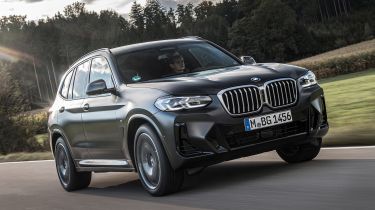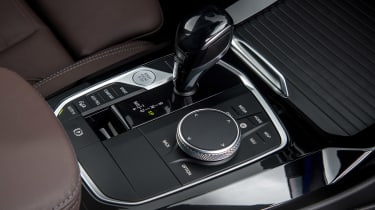BMW X3 (2017-2024) review - MPG, CO2 and running costs
The BMW X3 isn’t a budget option, but running costs should be as good as other premium rivals

Just so you know, this is an older review of the 2017-2024 BMW X3. If you are interested in information about the running costs of the latest BMW X3, or news of upcoming BMW models, please follow the links provided.
BMW is a premium brand, and that means overall purchase and running costs for the X3 are going to be higher than crossovers with lower badge values. Comparisons to the rest of the premium sector shouldn’t throw up too many shocks though.
The same goes for fuel economy and emissions, which fall into the same ballpark as upmarket rivals. However, these are big, heavy vehicles, and it will be relatively easy for owners to return real world figures that look much less appealing than the official test results. If you really want minimal running costs, the all-electric iX3 is the way to go but we’re concentrating on the petrol and diesel models here.
Talking of which, the smallest 2.0-litre diesel returns a WLTP combined test result of up to 48.7mpg, with CO2 emissions from 152g/km. The 3.0-litre diesel isn’t that far behind, capable of eking out a test figure of up to 44.8mpg with emissions of 164g/km. The 2.0-litre petrol offers up to 37.2mpg with 173g/km in xLine trim, while the racy X3 M40i will theoretically manage up to 31.0mpg, while producing up to 210g/km of CO2.
Used - available now

2020 Kia
Picanto
17,839 milesManualPetrol1.2L
Cash £10,300
2023 Volkswagen
Tiguan
32,504 milesAutomaticPetrol1.5L
Cash £22,800
2018 Audi
S5
46,677 milesAutomaticPetrol3.0L
Cash £22,287
2018 Mercedes
A-Class
36,143 milesAutomaticPetrol1.6L
Cash £14,100Many of these cars will be bought by companies for their employees – the Benefit-in-Kind tax brackets are 34 to 36 per cent for the 2.0-litre diesel and 36 to 37 per cent for 3.0-litre diesel models. The 2.0-litre petrol X3 gets a 37 per cent rating, while the plug-in hybrid costs between 11 and 14 per cent. The M40i is taxed at the top-rate 37 per cent. With all X3 models priced at over £40,000, buyers will also incur the extra £355 annual road tax in years two to six.
Insurance groups
The BMW X3 insurance group ratings are similar to the outgoing model, which means the 2.0-litre petrol sets the ball rolling at group 30 (out of 50), while the 2.0-litre diesel is a little higher in groups 32-33, depending on which specification you opt for. The 3.0-litre diesel and the more powerful M40i both attract a group rating of 41, with the M40d in group 43.
Depreciation
While the previous generation BMW X3 was subject to a fair amount of dealer discounting which had a knock-on effect on used prices, the latest model is likely to depreciate at a rate closer to the likes of the Audi Q5 or Land Rover Discovery Sport. Our experts predict it will retain between 48 and 54 per cent of its value after three years and 36,000 miles, with the 2.0-litre petrol and PHEV models performing the best.









